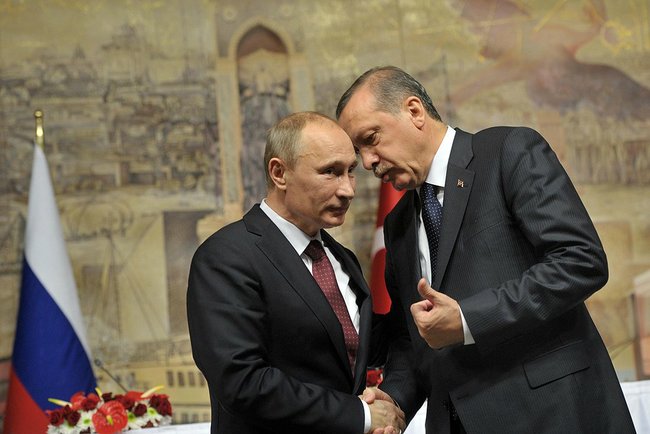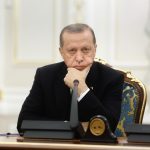by Mark N. Katz
It is commonplace to observe that U.S. missteps in the Middle East will end up benefiting Moscow. Often, though, these observations are either mistaken or exaggerated. What is described as a misstep may only be a U.S. policy that the observer dislikes. The U.S. policy identified as a “misstep” may simply not be to the liking of a Middle Eastern government about which the observer is especially concerned. Warnings that Moscow will benefit unless Washington changes course are often made to induce the U.S. to adopt a policy more to the observer’s liking when other appeals prove unsuccessful. And even if the U.S. policy in question really is a misstep, Russia is not always in a position to capitalize on it. Indeed, Moscow has been known to make mistakes of its own.
But when it comes to Donald Trump’s recent statements about withdrawing U.S. troops from northeastern Syria, acquiescing to Turkey’s intervention in this area, and essentially abandoning the Syrian Kurdish forces there with whom U.S. forces have fought against ISIS, there is absolutely no ambiguity. Trump’s actions have betrayed a longstanding ally and damaged America’s reputation. And Moscow will definitely benefit from Trump’s actions.
Indeed, what Trump has done furthers two narratives that Moscow has long advanced in the region. The first is that while Russia is a reliable ally, the U.S. is not. Many in the Middle East may not approve of Moscow supporting Bashar al-Assad’s regime, but they respect Vladimir Putin for sticking by Russia’s beleaguered ally in Syria (even if then-President Dmitry Medvedev did not do so for Muammar Gaddafi in Libya in 2011). By contrast, Trump’s abandoning the Syrian Kurds is seen as just the latest example of the U.S. not firmly supporting its allies in the region—including the Shah of Iran in 1979, Egypt’s Hosni Mubarak in 2011, and Turkey’s Recep Tayyip Erdogan during the coup attempt against him in 2016.
The second narrative is one directed at the Syrian Kurds themselves. Putin has long sought to persuade them that they cannot rely on America’s fickle support, and so the best option for them is to make peace with the Assad regime—which Moscow can help them do. As a result of being under attack from Turkish forces and without help from the U.S., the Syrian Kurds may well conclude that they have no other choice but to take up Moscow’s offer to mediate a deal with Assad.
What is especially amazing about this situation is that even though Trump has betrayed the Syrian Kurds by acquiescing to Turkish military action against them, Trump’s expressions of disapproval for what Erdogan is doing and threats to damage Turkey’s economy means that Trump does not even get the benefit of improved relations with Ankara in return for enabling its intervention. Putin, by contrast, stands to not only improve Russia’s ties with the Syrian Kurds, but gain from a further worsening in the relationship between Washington and a NATO ally. Further, just by expressing his misgivings about Turkish actions in far more measured tones compared to Trump’s rantings, Putin appears to be far more consistent a partner not just for Erdogan, but for other Middle Eastern leaders as well.
If nothing else, Trump’s abandoning America’s Syrian Kurdish allies, as well as his erratic behavior generally, will encourage other Middle Eastern leaders to hedge against Trump treating them in a similar fashion by seeking pragmatic cooperation with Putin—something that will undoubtedly be on display during his upcoming trip to Saudi Arabia in a few days, even though Riyadh is not happy about Moscow’s close ties to Tehran.
In the over 35 years that I have spent writing about Moscow’s Middle East policy, I have often tried to point out how the USSR or Russia will have difficulty capitalizing on regional dislike of various U.S. policies. But on this occasion, I simply cannot do so.






Trump appears to have a special relationship with Erdogan which may be the motivation for the green light to invade Kurdish areas of Syria adjoining Turkey. Trump first attempted this in December 2018. The resignation of SecDef Mattis coupled with efforts by John Bolton and others to control damage prevented a scenario like the current one.
Following the murder of Khashoggi in Turkey Trump sought to prevent Erdogan from releasing evidence of the killing possessed by Turkey. One favor that Erdogan is said to have desired in exchange for his silence was the extradition of Gulen, accused by Erdogan of masterminding the 2016 failed coup. Trump attempted comply, but U.S. courts found Turkey’s extradition request inadequate. In effect, Trump may have owed Erdogan a favor. The affair, however, may have deeper roots. Trump’s national security advisor Mike Flynn lobbied for Turkey and his company even took on a project to kidnap Gulen and fly him to Turkey on a private plane. The same team also had involvement in the attempt to release Turkish-Iranian gold dealer Reza Zarrab which according to an October 10 2019 Bloomberg article was the subject of a 2017 meeting involving Tillerson and Giuliani where Trump asked Tillerson to intervene on behalf of Giuliani’s client Zarrab. Trump’s conversations with Erdogan appear as relevant to the impeachment inquiry as Trump’s conversations with Ukraine’s president Zelensky. Was Trump’s decision to greenlight Erdogan’s invasion of Syria based on his personal interests or U.S. national interests?